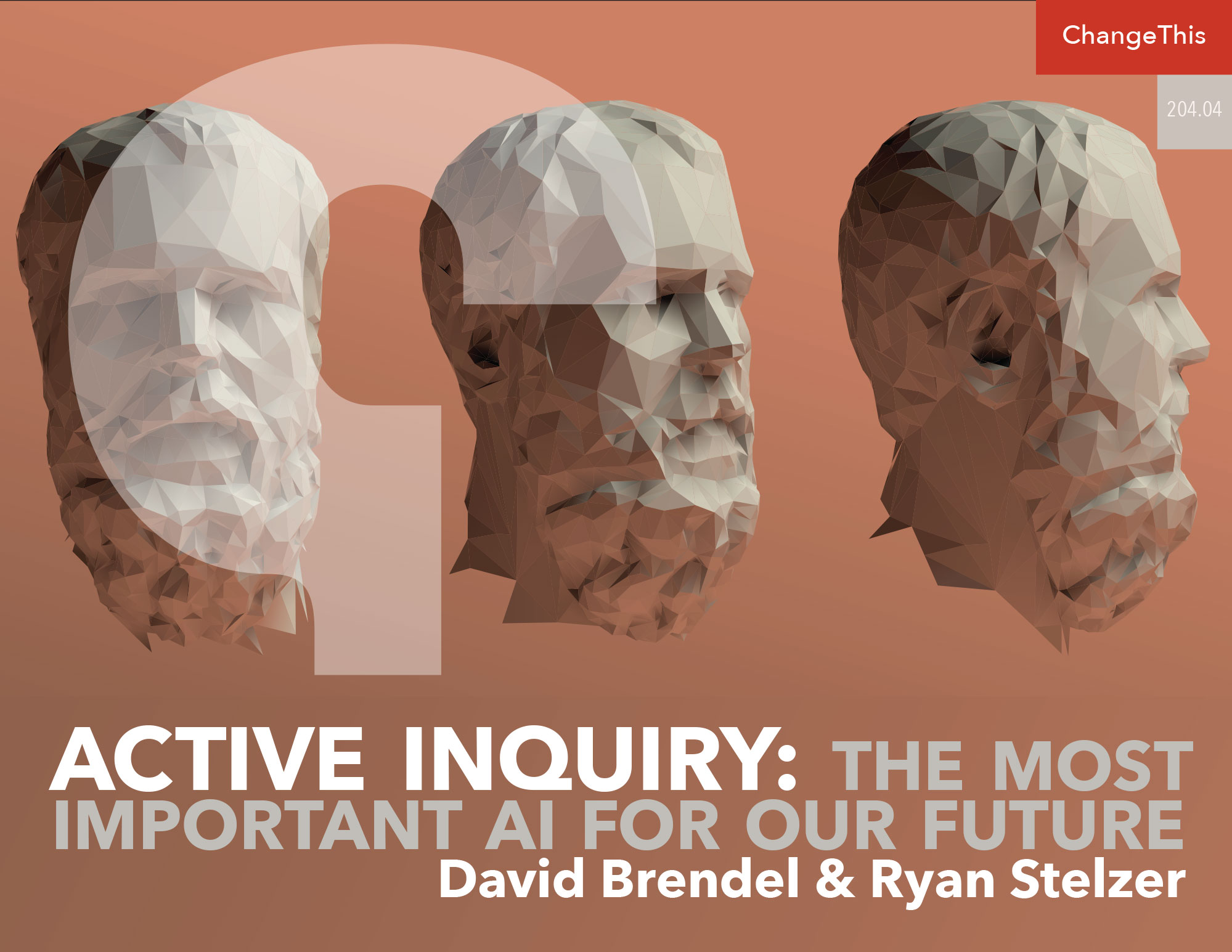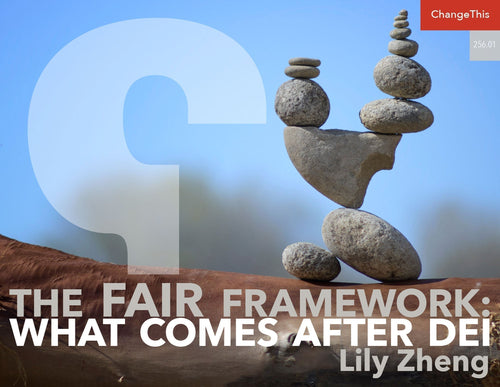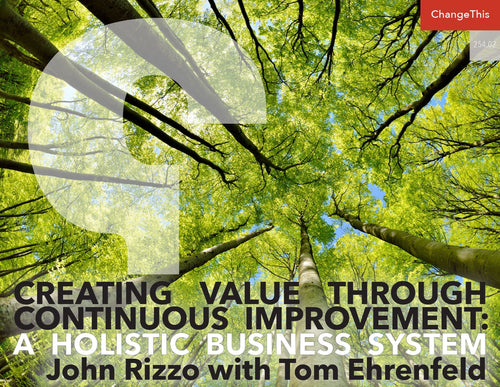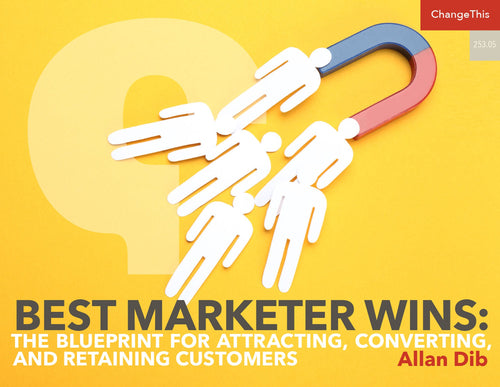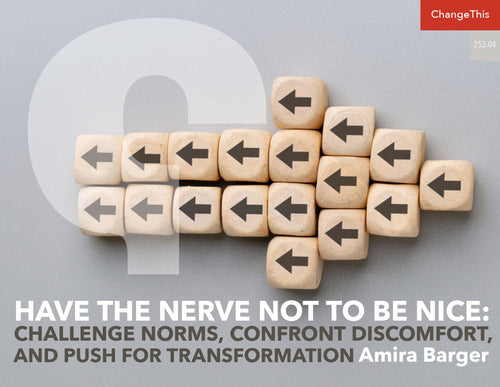Active Inquiry: The Most Important AI for Our Future
Modern physics teaches us that light can act as a wave or a particle, depending on the context and how it’s measured.
Likewise, human activity can be measured in many ways, depending on the perspective we choose to take. In business, we too often think exclusively about the bottom line, neglecting other phenomena— respect, collaboration, trust, social cohesion—that are actually essential determinants of achieving the long-term success we’re looking for.
The primary problem among so many organizations today is that they’ve taken the perfectly reasonable management adage that “what gets measured gets done” and pushed it to such an extreme that the numbers are all that matter. As a result, the well-being of each individual, as well as the overall performance of the group, suffers. Moreover, this obsession with numbers puts society as a whole at risk.
Until very recently, the most egregious example of the quantitative mindset driven into the ground was the shortsighted but all-too-prevalent belief that “the CEO’s only responsibility is to increase shareholder value.” This obsession with a single metric (return on investment) has meant that, for the past several decades, other stakeholders (the customers, the community, the employees, the environment) have gotten the short end of the stick.
Making matters far worse, especially in new and disruptive industries, the “numbers guy” is often hidden inside a machine—literally an algorithm. Similarly, medical-treatment algorithms have resulted in certain advances, but in too many cases have compromised personalized medical care and, in some worst-case scenarios, led to unnecessary death.
Looming over our numbers-obsessed society is another overly revered metric—GDP—that tells us nothing about social progress or quality of life or any other meaningful benchmark. All GDP tells you is how much stuff gets produced. According to this narrow and myopic metric, the value of mastering the violin, or of teaching children to read, or of making sure they have clean air to breathe is nothing compared to the value of producing tons of steel or rubber or what have you. And this value distortion holds true even when the valued commodities are taken to the desert and blown up, which is the kind of thing nations often find themselves doing when they value quantitative goals over human principles.
Extend the mindless pursuit of higher GDP numbers globally and you find yourself staring down the biggest big-picture question of them all, which is whether our species will survive. In 2019, the United Nations released a study authored by its Intergovernmental Science-Policy Platform on Biodiversity and Ecosystem Services, drafted by a host of social and physical science experts, which offered a grim reality check on the future of our planet by the numbers. More than one million species—one-eighth of all of earth’s plants, insects, and animals—face extinction in just a matter of decades. The authors of this landmark study concluded without equivocation that the “relentless global pursuit of economic growth is driving the collapse of life on earth.”1
Separately and together, the two of us have spent our careers at leading institutions, including the White House and Harvard Medical School. Based on our experiences working in these challenging environments, we decided to write a book that intersects with the worlds of academia, health care, business, and government, putting forth a proactive methodology—Think Talk Create—that knows no industry limitations or professional borders. In each of these domains, we’ve witnessed institutional deterioration and stress-related illness due to an insipid, mind-numbing, and hostile management style focused far too much on the numbers and not nearly enough on the people. As a result, we often find ourselves counseling professionals who are standing on the metaphorical— and sometimes literal—ledge, about to jump. Our professional odysseys have led us to recognize and diagnose the pervasive common cold of our modern-day working world: the overreliance on numerical thinking to the exclusion of all else.
We’re hardly the first to push back against the “shareholder value über alles” ideas of people like economist Milton Friedman and Harvard Business School professor Michael Jensen. And plenty of others—most recently Shoshana Zuboff in The Age of Surveillance Capitalism—have sounded the alarm over the encroachment of algorithms and artificial intelligence into every aspect of our lives. The push and pull between quantitative and humanistic mindsets, between what we can know about ourselves reductively and what will always be inexplicable, goes back millennia and remains with us today, informing discussions about economics and health care and every other domain of existence. In a recent New York Times article, Amir Alexander, a historian of mathematics, described this conflict as “a long struggle pitting the human advocates of mathematics and order against an unruly world that seems to keep its deepest mysteries to itself.”2
Math and empirical science have gained the upper hand, and there’s no doubt that they’ve made a huge contribution to our well-being. But, as we shall see, human complexities always intrude, and we disregard those subtle and disruptive forces—emotion, meaning, purpose, individualism—at our peril.
French biologist Jean Rostand said that “science has made us gods even before we are worthy of being human.”3 We’re still struggling to figure out how to incorporate an explosion of data and technology into our everyday lives. This is especially true in corporate and professional settings, where we continually grapple with such necessities as financial metrics, computer algorithms, evidence-based medicine, and other quantitative resources that are helpful but, if left unchecked, can take on a destructive life of their own. How do we make sure the tail doesn’t wag the dog? How, in other words, can we guarantee that these technologies don’t determine the course of human lives but are, instead, leveraged in the service of our common values? We can’t just be tech gods. We will be worthy of being human only when we figure out why we’ve developed such sophisticated math and science in the first place and understand to what purposes we should apply them.
Our approach to improving both the lives of individuals and the performance of organizations is based on AI—but not the kind critics of technology gone awry worry about. Our “AI” doesn’t involve anything silicon based. Instead, it refers to a very human process known as active inquiry, the polar opposite of the top-down, command-and-control, strictly by‑the-numbers approaches that have prevailed for decades (even when the decision-making is supposedly distributed, or evolving through machine learning).
Active inquiry is as ancient as the Acropolis and as current as the latest research in neurobiology. It melds old and new to examine the influences that allow human beings to succeed—which includes being highly productive at work. Think Talk Create is the practicum for active inquiry; it’s the disciplined, step‑by‑step process that allows active inquiry to take hold and drive results.
Tens of thousands of years ago—probably the first time a tribe of humans had enough to eat and a few hours with no immediate mortal threat—people began to think about what it all means, which gave rise not just to religion but to what would flower among the Greeks as philosophy. We both pursued graduate degrees in philosophy, buttressing our professional skills with humanistic concepts such as value, truth, and meaning. It was these ideas that influenced our thinking about how individuals, companies, and communities can thrive.
Active inquiry, derived from our time studying the ancient Greeks, teaches individuals how to think carefully about a challenge or opportunity, how to engage peers in dialogue via open-ended questioning, and how to collaboratively build a strategy. Through this process, our kind of AI—active inquiry—cultivates respect and empathy, establishes trust, defines collective values, and, as a result, increases innovation and ultimately financial performance. The so‑called soft skills, it turns out, constitute a hard science.
But active inquiry is no quick fix. Nor is it the idea of the month to be discussed at this year’s corporate retreat, only to be replaced by next year’s model. In keeping with that old adage about teaching someone to fish and they have food for life, active inquiry teaches you how to live your life in an entirely new way—which is also a very old way.
Socrates, an inspirational figure for us, attempted to solve the difficult problems of his society, but as far as we know he never picked up a stylus to make a single calculation. Instead, he spent his days having in‑depth conversations with his fellow citizens of Athens. He’d gather a group, ask open-ended questions—questions that do not have simple yes‑or‑no answers—and together they would try to reach some kind of insight and truth. It was a remarkably effective technique—in philosophy it’s still taught as the “Socratic method”—because it empowered partners in conversation to engage in both self-discovery and collaborative reasoning.
Active inquiry represents our best opportunity to engage each other in meaningful collaboration, but to succeed it requires self-reflection and self-restraint. While appearing deceptively simple on the surface, active inquiry depends on careful construction of questions that don’t contain even subtle judgments or biases. It must be truly openminded and focused on learning, free of preconceived notions. The commitment to listening and learning must be paramount. We must aspire to be excellent conversation partners, applying as much seriousness and focus as we do in our analytical work in science, technology, medicine, and business in a data-driven world.
As a result, active inquiry, and the process of Think Talk Create, can be developed and honed only with intensive practice. On the surface, the methodology appears so obvious and straightforward that many people hardly pay it any mind. But it turns out to be the most difficult and elusive skill necessary in the modern quantitative era. The time and effort to learn it are well worthwhile, with impressive payoffs for quality of life, human dignity, and profitability in a capitalist society.
What both artificial intelligence and active inquiry have in common is a facility for learning. But neither the AI machine nor the inquiring human brain is fully hardwired, whether by software code or genetic code. Instead, both are plastic—that is, highly adaptive to new challenges. They engage in self-organization, responding not in a fixed, preprogrammed manner to inputs but instead in a bottom‑up, agile fashion. In active inquiry, dialogue is the primary driver of learning and self-organization. The applicable “machine” is inside our skulls, and it consists of networks of about eighty-six billion nerve cells, with unfathomable interconnectedness. Numbers are important inputs, but to avoid catastrophically bad decisions, conversation, nuanced judgment, and complex decision-making are also required.
People working in teams to get things done care about results—as do the people they report to—so can the soft skills we’re talking about deliver the goods? How do active inquiry and attentiveness to humanistic values stack up against hiring the best people with the best technical chops?
In 2012, that most quantitative of companies, Google, embarked on Project Aristotle, a two-year study to discover what makes the perfect team. The researchers found that individual expertise was not the secret sauce. In fact, in a finding that harkens back to William Muir and his chickens, no characteristic of any individual team member or members explained the success of the best-performing groups. Instead, it was an emergent property of the team as a whole, psychological safety, that turned out to be most essential. And what does psychological safety mean? It is an interpersonal dynamic in which each individual feels encouraged and empowered to share ideas and insights proactively. In 1990, William Kahn defined psychological safety as “being able to show and employ one’s self without fear of negative consequences of self-image, status or career.”4 It’s been championed in recent years by Amy Edmondson, a professor at Harvard Business School, whose research has shown that the absence of psychological safety can lead to “colossal business failure.”5
For further endorsement of the kind of trust building and open dialogue we prescribe, consider, if you will, the following:
- In one study, nearly one hundred managers were broken into small groups and asked to solve a specific strategic challenge. But before they could begin brainstorming, one group was asked to go around and share personal stories of success, while the other group was asked to share personally embarrassing stories. After just ten minutes of conversation, the teams that had shared embarrassing stories generated 26 percent more ideas than those that had shared personal success stories. A psychologically safe environment—in this case, an environment in which people had been willing to reveal their foibles and vulnerability—fosters creativity and enhances performance. It allows ideas to be shared freely and teams to collaborate without fear of judgment, reprisal, or loss of status.6
- The Wall Street Journal has found that employees who underwent empathy training generated up to 50 percent more net income than those who did not participate.7
- When the University of Southern California crisscrossed the globe asking business leaders what attributes executives must have to succeed in today’s digital, globalized economy, they identified five essential characteristics: adaptability, cultural competence, intellectual curiosity, empathy, and 360-degree thinking.8 Each of these core characteristics can be enhanced through our version of AI, active inquiry.
- The Carnegie Institute of Technology at Carnegie Mellon University has found that approximately 85 percent of financial success is related to skills in “human engineering” (personality and ability to communicate, negotiate, and lead) while only 15 percent is related to technical proficiency.9 Similarly, a comprehensive 2006 study led by Accenture found that interpersonal competence, self-awareness, and social awareness were better predictors of success than conventional quantitative metrics.10
- Kara Swisher, a New York Times contributing opinion writer about technology, has 204.04 reported that the latest trend among high-flying tech companies is hiring a CEO. No, not the extravagantly compensated executive in the corner office with no paper on their desk. In this instance, after so many episodes of inappropriate sharing of customer data and inadvertent collusion with foreign despots, the new, in‑demand CEO is the chief ethics officer. It seems that brilliant mathematical minds designing near-magical technology can get into serious hot water without the help of a good old-fashioned moral compass.11
- Research from Stanford and the World Economic Forum has shown that work is one of, if not the greatest, source of anxiety, depression, and stress-related disorders.12 Suicide rates have skyrocketed 24 percent during the past fifteen years, and a 2015 study published in the American Journal of Preventive Medicine concluded that one of the primary factors for this spike was “distress about jobs.”13 The primary demographic affected by suicidal ideation is adults of working age, and it’s been shown to plague groups ranging from call-center workers to hedge-fund managers, accountants, doctors, lawyers, consultants, and all in between.
- Finally, an endorsement from the unlikeliest of places: management consulting, where a large-scale consulting operation showed equanimity, respect, and an eye to longterm growth and profitability in its response to the global COVID‑19 pandemic— something that was seemingly impossible for a number of dysfunctional governments in their poorly orchestrated responses. Using active inquiry to its advantage, this company sought to improve its organizational culture in the midst of COVID‑19 chaos instead of telling employees to suck it up because times are hard for everybody.
Quantitative metrics leave little room for the supposedly soft human realities such as the need for empathy, connection, and meaning. The “quant jocks” have actually put us back with the hunter-gatherers—before they found that first moment by the fire to scratch some animal pictures and wonder about the meaning of existence. The quantitative marching orders are, “The only reason you need for doing this is so you can keep on doing it. Raw survival. A full belly. Nobody says you’re supposed to like it. Nobody says you’re supposed to care. Just make your numbers.” This is as true for a hedge-fund manager as it is for an Amazon warehouse worker. The “master of the universe” may have more creature comforts and amazing vacations, but workers all across the income spectrum share the same stark reality: whatever you’ve got, make your numbers or it all goes away. In the words of Tennyson: “Nature, red in tooth and claw.”
Yet the latest science shows us that the human brain evolved to its current size and complexity largely because greater size and complexity provided two advantages for survival that had very little to do with individual aggression and competition. These are the ability to manage relationships within a larger and more complex social group and the ability to piece together random and chaotic experience into a consistent narrative—that is, to make meaning, which is the only way you can begin to think about making tomorrow better than today. So when critics say that what we’re offering sounds “soft,” and that they want approaches that are hard-headed and “scientific,” we invite them to update their knowledge of science.
Another old adage says that crisis brings opportunity. For all the pain and dislocation the COVID‑19 pandemic has caused—at least by rattling everyone’s routine, if not their sense of personal safety—it has rekindled questions of value and meaning for millions of people. Socially isolated and forced to think about death as an all-too-real daily possibility, many of us have reflected on modern organizations’ imposition of a Hobbesian view of life as “nasty, brutish, and short.” Many of us chimed in with Peggy Lee, singing, “Is that all there is?” We’ve also opened our eyes to just how bankrupt and foolish this “don’t ask questions, just march” view is, especially when it flies in the face of what we’ve learned from modern neuroscience, evolutionary biology, and behavioral economics.
“What, after all, is the economy’s purpose?” Paul Krugman asked in a New York Times oped in response to the pandemic. “If your answer is something like, ‘To generate incomes that let people buy things,’ you’re getting it wrong—money isn’t the ultimate goal; it’s just a means to an end, namely, improving the quality of life.” And what’s the best way to begin to enhance quality of life? “Not dying,” he concludes.14 And yet some employers have pushed their workers to maintain productivity during the COVID‑19 crisis without providing adequate protections to prevent disease transmission—the ultimate dehumanizing workplace.
We take the opposite approach, drawing on the work of cutting-edge researchers such as Paul Zak, the founder of neuroeconomics, who showed us the power of trust in economic development, and Daniel Kahneman, who showed us how misguided it is to appeal only to human rationality, especially what mid-twentieth-century economics called “rational self-interest.” A new wave of science has shown that linear rationality is simply not the way the human mind and human motivation operate. We are highly irrational creatures, deeply emotional and deeply social, and our sense of social and emotional well-being has a huge influence on how well we perform. A complex, often surprising human being lurks behind the numbers, undermining our evidence-based predictions of how they’ll behave. We are living in a post-Newtonian world, where theory and research in quantum physics have revealed how indeterminate and uncertain existence really is. If that sounds soft, we say, “Welcome to the future.”
In organizing and codifying a force to oppose dehumanization, we offer Think Talk Create as a rigorous approach to collaborative learning and problem-solving. In medicine, it’s important to give the patient relief from immediate symptoms, but it’s also necessary to address the underlying disease. Similarly, an organization that’s under the gun can make any number of financial and operational adjustments to produce a healthier-looking quarterly report, but that’s just symptomatic relief. We need to go more toward the root of the matter, and active inquiry paves the way. It exhorts us to keep an open mind, gain essential information, and diagnose tricky human problems hidden under reams of quantitative data. It also helps us to treat work-related challenges by fostering transformational conversations and constructing novel solutions. All of this empowers a more energized work environment, a more successful organization, and the safer, healthier community needed to sustain it over the long haul.
Adapted from Think Talk Create: Building Workplaces Fit for Humans.
Published by PublicAffairs.
Copyright ©2021 by David Brendel and Ryan Stelzer.
ABOUT THE AUTHORS
David Brendel, MD, PhD, is the co-founder of Strategy of Mind, an executive coaching, consulting, and leadership development firm rooted in philosophy and psychology. He a boardcertified psychiatrist with an MD from Harvard Medical School and a PhD in philosophy from the University of Chicago. His writings have appeared in Harvard Business Review and Huffington Post and is the author of Healing Psychiatry: Bridging the Science/Humanism Divide (MIT Press). He lives in Massachusetts.
Ryan Stelzer is co-founder of Strategy of Mind. He served in the Obama White House as a presidential management fellow where his team was responsible for improving and sustaining high levels of performance across federal agencies. His writing has appeared in the Washington Post, Huffington Post and LinkedIn Pulse. He lives in Massachusetts.

